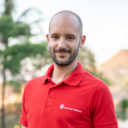Fabian Emmenegger is PR and Communications Manager at Save the Children Switzerland and was recently in Malawi for a media trip. In the interview below, he reports on the project he visited and what that experience meant to him personally.
What will you take away from the project?
Well, malaria is endemic in Malawi in all parts of the country and is one of the main causes of death for children there. The fact that this is changing, and that our work directly helps the people affected gave me hope. In the Zomba district, Save the Children is currently paying for all the materials, but this will change. This means that we will be able to focus on training the teachers, which will have a major impact on children’s health. The teachers I met were very motivated and were happy to be able to help the students. I found it incredible to see how we make such a difference for these children. It was an unforgettable experience.
What was your role in this project?
We were there on a media trip with two journalists. I prepared a programme beforehand with Save the Children staff from Malawi, and made sure that the journalists received a big-picture view of the project during the visit. We wanted to tell the story of a child who comes to school, doesn’t feel well, and is then examined, treated and referred to the hospital, so that the readers understand this process.
To what extent has your perspective on malaria changed as a result of this visit?
It’s changed a lot. I’m now much more aware of how omnipresent the issue is. It’s the main cause of death for children: almost everyone here has had malaria, knows someone who has, or has lost family to it. I was not so aware of that before; it’s just not so precarious for us. I also find it difficult knowing that I can just take prophylactic medication, but in Malawi so many people die from malaria. Our project is a good start and a great intervention to help change the way we deal with this disease, but it will take a much bigger overhaul of our thinking to really stop this disease in its tracks.
